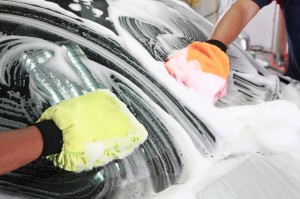Posted on 9/2/2014
Motor oil is the MOST IMPORTANT fluid in your vehicle. Why you ask? First, the oil protects the motor from heat that comes from all the moving parts inside the engine. Oil also cleans the inside of the engine protecting it from corrosion. Most motor oils are made from petroleum crude oil processed into motor oil. With this type of oil we recommend an oil change every 3,000-3,500 miles. Why? Because the heat and pressure inside the engine degrades the oil and it becomes quite dirty from keeping the engine clean. If the oil is left to long it will start to sludge up. When your next oil change comes around all the sludge may not come out leaving you with build up or residue inside the motor and can cause parts to plug up or corrode. Synthetic oil is an alternative to the standard mineral oil motor oil and is used in many newer vehicles. Synthetic oil is made from chemically modified compounds (synthetic materials) and can offer several advantages to car owners who are lo ... read more
Posted on 9/2/2014
When buying a used car one thought always seems to surface even if it is never spoken, “when will this car need a repair or maintenance?” One way dealers will try to give you peace of mind in your decision is by offering an extended warranty. But before you sign on the dotted line make sure you know all the details. What is an Extended Warranty? After a designated time the manufacturer’s warranty on a vehicle expires. Most warranties tend to last around three years or three thousand miles. Some cars can even have multiple warranties that vary from comprehensive coverage all the way down to seat belt coverage. An extended warranty is a warranty that can be added to a vehicle once the first warranty has expired. But adding an extended warranty also means adding additional fees. And some fees may not be worth adding. Research When you are purchasing a used vehicle be sure to do y ... read more
Posted on 9/2/2014
You may have an alignment problem if your car drifts or pulls to one side, your steering wheel’s off center, you have uneven tire wear or your car doesn’t feel like it handles right as you travel around MO. When all of your Kansas City vehicle’s wheels are lined up exactly with each other, your wheels are in alignment. Running into potholes, smacking a curb or other Kansas City street hazard are great ways to knock your car out of alignment. Then one or more of your wheels starts pulling in a slightly different direction and the problems begin. Driving for an extended time when you’re out of alignment causes your tires to wear unevenly and excessively. Sometimes the tire can be worn so badly that it will fail. At the very least, you’ll have to replace your tires sooner. You could end up with premature wear to your suspension system, which can be really expensive. The front wheel alignment is adjustable on all vehicles, and the back wheels are also adjustable on some cars. Now, let ... read more
Posted on 9/2/2014

Spring cleaning is a process with many aspects. Oftentimes we focus the bulk of our attention on the house, be it inside or out. We’re forever preparing beds for flowers, tilling gardens, organizing this and that, or painting the shutters. Yet, we invest just as much time and money in our vehicle(s) so why not spend a little time this season giving it a good once over too. Our last post announced National Car Care Month. Just because April has come and gone, doesn’t mean you should stop caring! Though winter may not feel like it’s that far behind us just yet, it is certainly spring at last. Those winter months of sudden heavy snow, ice, and wind are hard on a car. Wash and wax as you might, it will never be the same as a thorough detailing job done right. What’s the Difference? While washing and waxing will leave your car ... read more
Posted on 9/2/2014
While we realize that nobody enjoys spending their hard-earned cash on tires, it’s one of the critical functions of car care and car maintenance. While forking over some hard-earned dough for tires may be difficult, it’s well worth the alternative of having an accident, hydroplaning, or getting a flat tire because of poor tire maintenance. While just about every driver knows that tires must be cared for (like aired up and all…) many don’t know the signs of tire wear, and when they’re in need of replacement. So here are some helpful, easy tests, for knowing when your tires need replaced. Test #1 – Test the steering. While it can be a slight difference, if your car is having a difficult time steering or navigating the roads, it might be an indication that your tires need replaced – or at least balanced. Test #2 – Are you Hydroplaning? One of the number one purposes of car tires is to (yes keep the car moving) – but also to keep water away from the car in order to create traction on ... read more